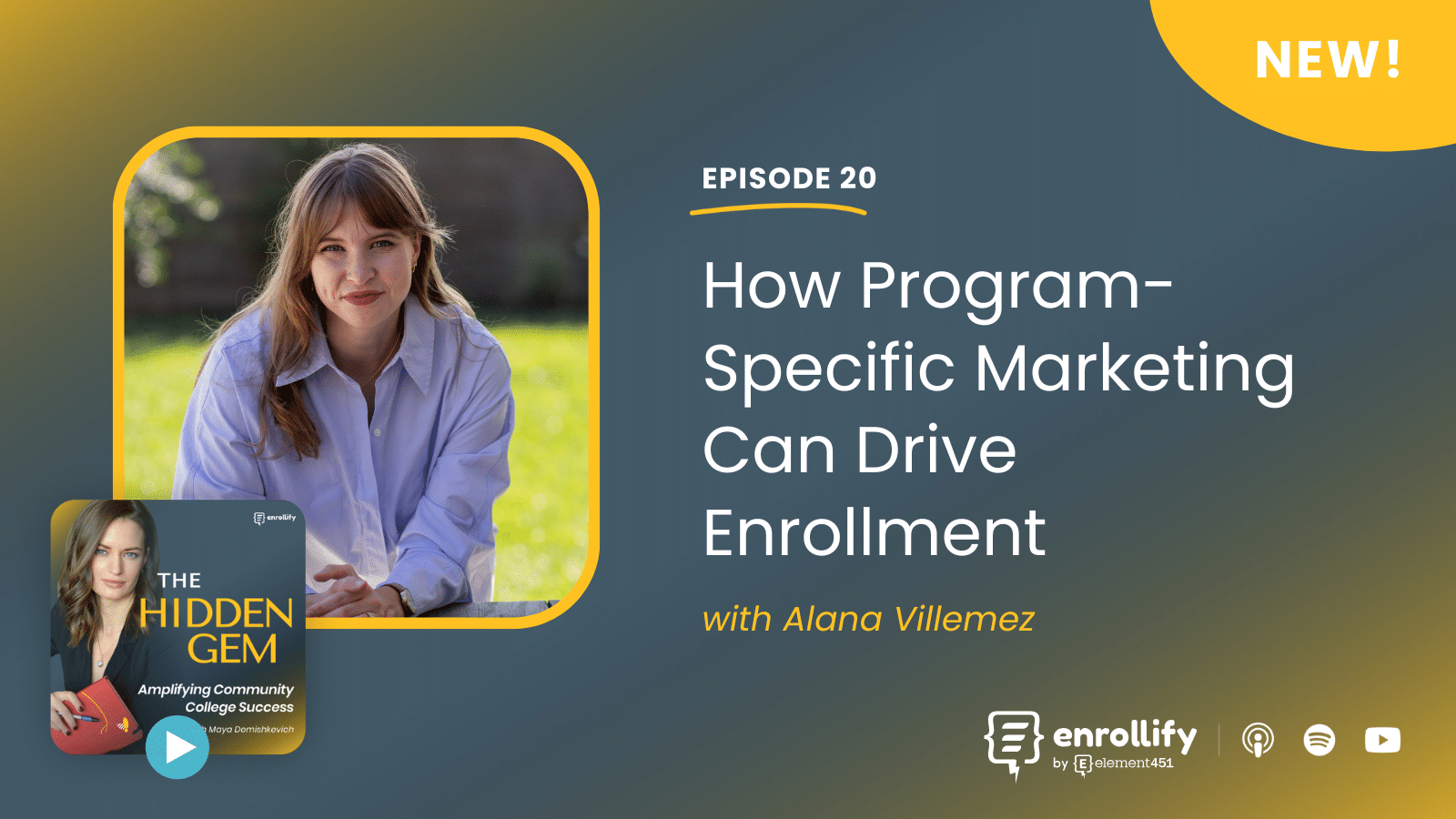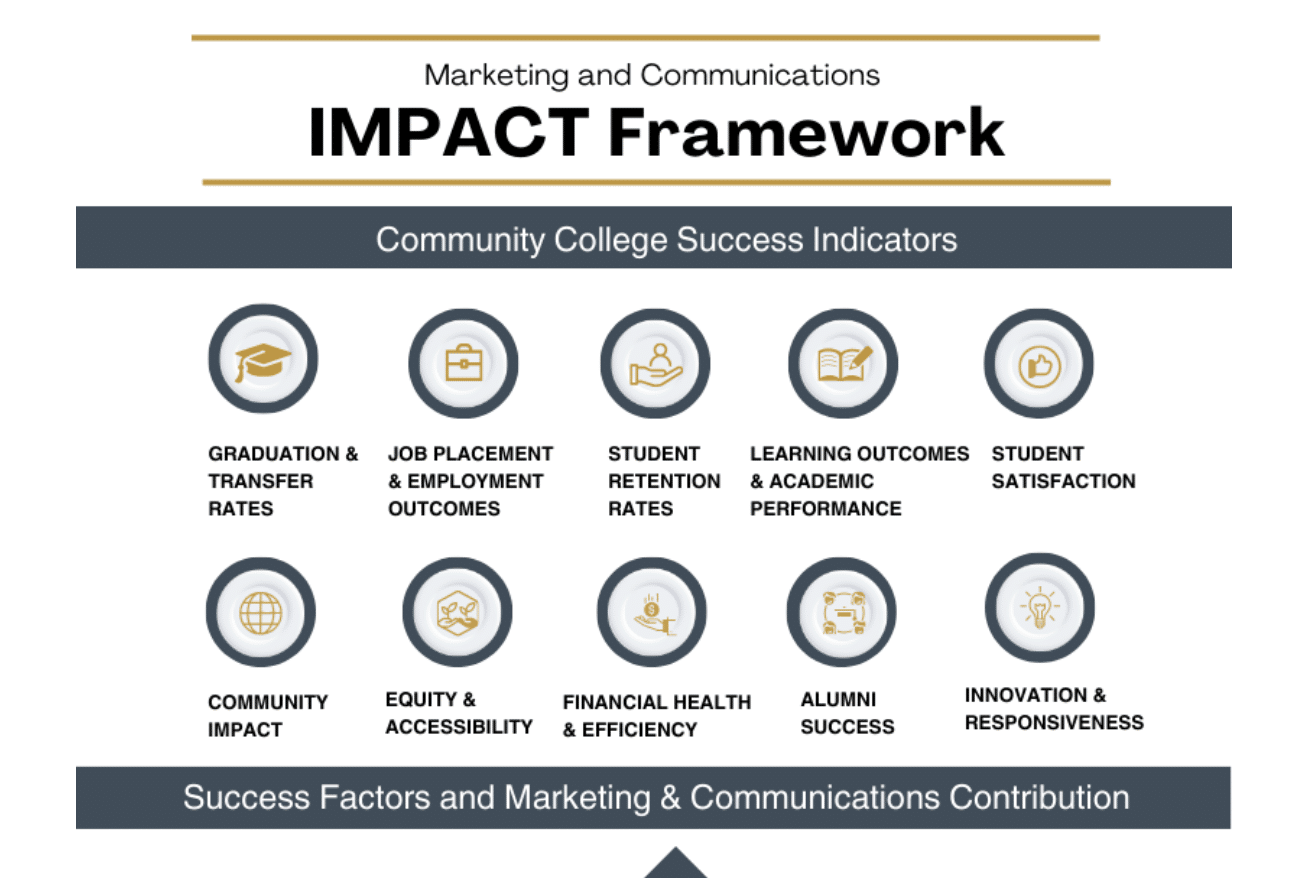Stay Ahead in Higher Ed Marketing
✅ Exclusive invites to FREE webinars
✅ Game-changing higher ed marketing insights
✅ Must-have resources to level up your strategy
Podcast
Episode 20

Episode Description
Guest Bio
Episode Transcript
In this episode of The Hidden Gem, Maya Demishkevich welcomes Alana Villemez, CEO of Most Likely to Succeed, to discuss the growing importance of program-specific marketing for community colleges. With extensive experience working with over 100 colleges, Alana shares insights into why colleges should prioritize marketing specific programs over broad awareness campaigns and how to effectively allocate limited resources to those efforts.
Key Takeaways:
Resources:
Community College Mission Pillars
Alana Villemez / CEO / Most Likely to Succeed
Alana Villemez is the founder & CEO of Most Likely to Succeed, an advisory firm focused on community college enrollment marketing. With over a decade of experience, Alana has worked with more than 100 community colleges to drive enrollment through strategic marketing and communications.
Alana created Most Likely to Succeed with the mission to make community colleges the number one choice for students across the nation. Most Likely to Succeed helps community colleges deliver on their promises by optimizing their enrollment strategies to better attract and support students, communities and local workforces.
As the creator of the Community College PROMISE Framework, Alana employs tailored methodologies—developed from her extensive experience working with community colleges— to empower community college professionals to drive meaningful change and redefine success within their institutions.
Podcast Transcript: "Program-Specific Marketing in Community Colleges" with Alana Villemez
Maya (00:01):
Welcome back to The Hidden Gem Podcast! Today, I’m thrilled to welcome Alana Villemez, CEO of Most Likely to Succeed. Alana has worked with over 100 community colleges, making her insights invaluable for today’s topic: program-specific marketing.
If you’re like me, you often get questions from program directors or department chairs about promoting specific programs. Today, we’ll unpack when program-specific marketing is appropriate, how to prioritize programs, and manage limited resources. Alana, welcome to the podcast!
Alana (01:09):
Thanks so much for having me, Maya. I’m excited to be here.
Maya (01:14):
Last time we spoke, you mentioned that colleges should prioritize program marketing over broad awareness campaigns. Why do you believe that, and are there any data points that support your view?
Alana (01:37):
Absolutely! My background is in workforce and economic development campaigns, helping colleges attract students to specific trade and certificate programs. Since the pandemic, there’s been a shift in what students seek—shorter programs with clear ROI and workforce outcomes.
For example, data from the National Student Clearinghouse shows declines in associate and bachelor’s degree completions, but a significant 4% increase in certificate completions over the last few years. This indicates a growing preference for shorter, targeted educational pathways.
Search behavior has also changed. According to Education Dynamics, more students are searching for programs first, rather than specific institutions. For instance, someone might search “equestrian program near me” and choose any college that offers it.
Maya (05:12):
That aligns with my experience, especially with adult learners who know what they want. However, high school students often come to community colleges undecided and use the time to explore different pathways. Was the data you mentioned focused on adult learners?
Alana (06:16):
Not specifically, but adult learners are a significant part of this trend. Many adults are returning to college to upskill, get promotions, or meet employer requirements. High school students, on the other hand, might explore different options or come in undecided.
Maya (08:16):
Do you think every program should be marketed individually, or are there exceptions?
Alana (08:35):
It depends. Colleges often group programs by industry clusters, like manufacturing, which might include HVAC, logistics, and electrician training. Marketing the broader industry first can help, but focusing on individual programs often yields faster conversions.
Maya (10:18):
That makes sense, especially with limited resources. Once a college decides to focus on program-specific marketing, what steps should they take to prioritize programs?
Alana (11:21):
The key is coordination. I recommend using a framework, like the product lifecycle, to assess where each program stands—whether it’s in the introduction, growth, maturity, or decline phase. New and growing programs should get the most attention, while mature programs might need support to sustain enrollment.
Maya (15:51):
And if several programs are in the maturity phase, how do you prioritize?
Alana (16:58):
Look at enrollment trends and community demand. Partner with your Institutional Research (IR) team to identify programs with declining enrollment but high community need.
Maya (18:05):
Once programs are prioritized, how can colleges effectively package and market them?
Alana (18:32):
Marketers should identify each program’s unique benefits—whether it’s quality education, career outcomes, inclusivity, or comprehensive support. I use a framework that ties these benefits to the broader community college mission. Ask faculty about program-specific resources, student experiences, or career outcomes to craft compelling messages.
Maya (21:03):
We use a creative brief during the pre-introduction phase to gather this information. I also have a checklist for program directors, outlining their role in marketing—like providing testimonials, distributing flyers, or connecting us with alumni.
Alana (22:34):
That’s a great approach. Collaboration is key to making program marketing successful.
Maya (23:46):
We’ve also had success packaging programs by interest. For example, we grouped short-term, high-demand career programs for adults and promoted them as pathways to quick, well-paying jobs.
Alana (24:17):
That’s a smart strategy! It keeps the student’s perspective front and center, which is crucial for effective marketing.
Maya (25:04):
Do you have examples of colleges that balance program-specific marketing with brand awareness?
Alana (25:22):
Yes! Holyoke Community College in Massachusetts does a fantastic job. They packaged their data visualization courses as “data storytelling,” which was more appealing than generic course titles like “Python 101.” Their follow-up system was also impressive—they called me a year after my initial inquiry to see if I was still interested.
Maya (29:33):
That’s a great example. It also reminds me of the importance of cross-promoting credit and non-credit programs. Many students might start with a shorter program and later transition to a degree.
Maya (29:59):
What are the most effective channels for program-specific marketing?
Alana (30:04):
Community colleges already use a mix of paid, earned, owned, and shared media. Start with pay-per-click campaigns targeting prioritized programs. Video content is also powerful—showcase the reality of modern programs like manufacturing to challenge outdated stereotypes. Simple, authentic visuals resonate most with prospective students.
Maya (33:26):
This has been a fantastic conversation. Your frameworks and strategies are incredibly valuable. Is there anything else you’d like to add?
Alana (33:45):
If you’ve had success with program marketing, create internal case studies to showcase results. This builds credibility and helps secure buy-in for future initiatives.
Maya (34:59):
That’s excellent advice. Alana, thank you so much for joining me today and sharing your insights.
Alana (35:13):
Thank you, Maya! Go market those programs!
Maya (35:16):
Absolutely!
If you enjoyed this episode, I’d really appreciate it if you could help spread the word—whether by sharing it with your colleagues, posting on social media, or leaving a review. Your support means a lot!
At the heart of the podcast lies the IMPACT framework that answers a pivotal question: What is the role of marketing and communications in the success of community colleges? This framework answers it by showcasing how these domains are not peripheral but central to amplifying the success of the institution.

Copyright 2026 College Crusader, all rights reserved.
✅ Exclusive invites to FREE webinars
✅ Game-changing higher ed marketing insights
✅ Must-have resources to level up your strategy
